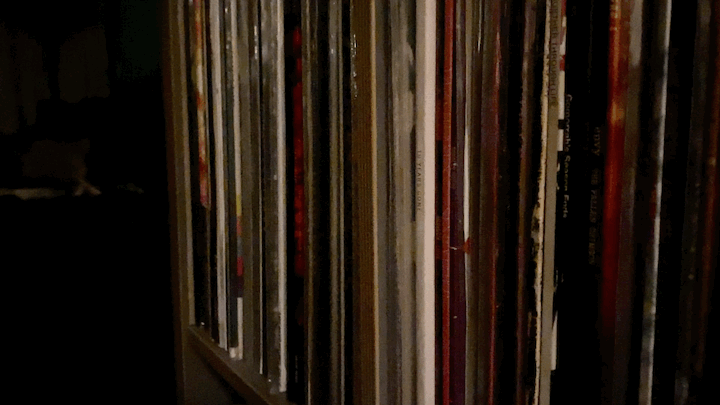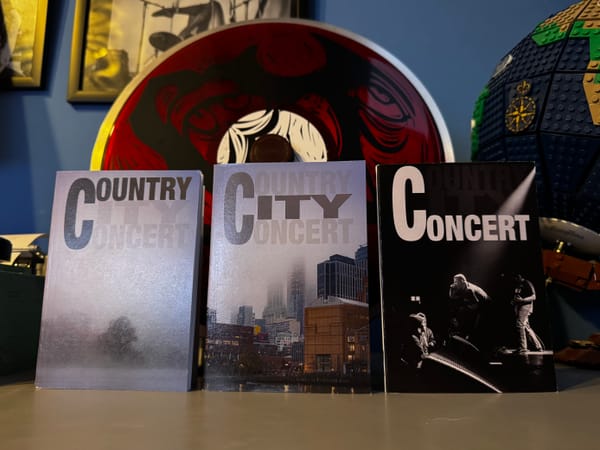Issue 2: Shelter – When 20 Summers Pass
Welcome to the spiritual jungle

In this one, our young protagonist converts to an ancient eastern religion on the promise of the salvation of his eternal soul and the easing of the burden of this physical manifestation of life. Or: I was a teenage Hare Krishna punk. And I’m ok with that now.
Part I: Spiritual surrender
Hare Krishna, Hare Krishna,
Krishna Krishna, Hare Hare,
Hare Rama, Hare Rama,
Rama Rama, Hare Hare
The man in front of the resplendent altar holding statues and photos of all kinds of deities and pious men kept repeating the same sing-songy mantra, as he was pumping air into an instrument that to my mind looked like an accordion and tiny piano mashed together. His head was shaved, except for a tiny little tail on the back. About a dozen people filled the tiny ‘temple’, which in all actuality was the living room of a house in a suburb of the Dutch city of Groningen. The visitors, myself included, joyfully sang along with the mantra.

This strange situation (to Western eyes, at least) was a culmination of events that started with the purchasing of a single record in the spring of 2000: Shelter’s When 20 Summers Pass (now available in a very nice 20th anniversary re-release, pictured in the photos included).
If ever I am in doubt that any seemingly random decision can lead to a strange and unexpected future, I need only remember the chain of events that led me to a small living room in a northern city in the Netherlands, filled with devotees of Krishna, singing along to the Maha mantra.
For some, the connection between the album and the events described above might not seem so strange, but for the timing of it. When 20 Summers Pass is kind of a late album by Shelter, a band considered the pioneers of the Krishnacore punk sub-genre.
But what can I say? Trends tend to pass me by, yet for some reason, whenever I do glom onto one, the wave has already crested and I have to be content wallowing in the ebbing waters of a once hip concept. So it also went with Krishnacore.
If you’re not familiar with this word, it’s probably because you were not involved in the hardcore punk scene of the ‘90’s and early ‘00’s. That is not a problem in and of itself, but you did miss out on a rather strange sociological phenomenon: punks (certainly not the most docile and dogmatic group of people, one would assume from stereotype) converting to the modern Western manifestation of an ancient Eastern religion.

This is where I get things a bit backwards, because on first play (and without any knowledge of the band’s past), When 20 Summers Pass does not seem like an overtly religious record (the cover of the original release pictured above). Truly, the only explicit reference is the track Song of Brahma, which opens with a sample of the Brahma Samhita, after which the song is named.
“What an interesting sample,” I thought at first listen, and then promptly forgot about it for a long time.
Indeed, I was simply enjoying the almost pop-punk-y songs with, for me at the time at least, refreshing lyrics that handled introspection, self doubt and the role of the ego in the handling of the human condition. Freshly stepping into a music scene where lyrics generally wouldn’t go much beyond superficial themes of honour, brotherhood or, in the case of a significant percentage of straight edge bands, a false sense of moral superiority, this was nice to hear.
“Hey, you know what? Maybe your ego is getting in the way of forming true connections with your fellow human beings” sure beats the hell out of “All my problems are caused by external factors beyond my control so I’m going to mope about it but do it in an awfully aggressive and not at all constructive way”.
It was this underlying theme that drew me to Shelter. As a 16-year old, which is what I was when this originally came out, I was a chronically sad youth. But in much the same way that some people handle their liquor in a poor way and are considered angry drunks, I had trouble dealing with my self-destructive tendencies in a way that didn’t impact those around me, and as such I could be described as a – and this is a technical term – ‘shitty depressed kid’.
I was clingy, seeking attention and validation around every corner and just being as unconstructive as could possibly be in any situation you’d put me in. It took about 20 years for me to able to look back at that period of my life with any sort of clear head and judge myself perhaps by a more milder standard. But boy howdy, was I… How to put this… Insufferable.
As it turns out, the things you surround yourself with have an influence on how you view the world. And shifting my musical input slightly from ‘the world is fucked and I want to die’ to ‘the world is fucked but at least I can do something about my own condition’ turned out to be helpful in a way I could not have foreseen at the time.
Songs like I Can’t Change History, reflecting on past prideful behaviour, or Loss Disguised As Gain which deals with our seeming inability to know when we’ve been handed a good thing because we’re already focussed on the next thing – are a nice change of pace, something new to ponder which helped to break me out of my downward mental spiral. And of course title track When 20 Summer Pass, which asks the simple but effective question: how are you gonna feel about all this (*gestures wildly at own life decisions*) later on? A question I had not seriously asked myself up to that point.
(Again: I was 16 and as you learn later on in life: teenagers are idiots. But that’s ok, too.)
Turns out, a catchy punk hook and some more-than-averagely involved lyrics was enough to set me down a spiritual path.

Part II: Do the Krishna
Where When 20 Summer Pass left the religion mostly implied rather than spoken aloud, it does not take much more than a very light toe-dip into the back catalogue of the band to find out what led up to this album. In fact, it only takes one step back in the discography to find Beyond Planet Earth, with cover art centered around the boar avatar of Vishnu, Varaha, who lifted the earth up with his tusks from the primordial ocean. So yes, one could consider that one a bit more of an explicitly religious record.
Beyond Planet Earth is also an incredibly strange record in the musical sense of the word. Aside from some very poppy punk songs, the album features some ska, some rap rock… It’s a strange beast coming from a band that started out in a niche underground scene where experimenting with one’s sound at times is considered a mortal sin – until it’s successful and everyone starts copying you.
Mantra was my next step in the catalogue, which, at time of release, was the band’s breakout succes and ticket to the global rock stage at large. An accessible record, for sure. Still, the first track opens with a sample of the Panca-tattya Maha Mantra, which offers obeisances to (according to legend) Krishna’s human avatar Sri Caitanya Mahaprabhu, who introduced the world to the famous (or infamous, depending on your leanings) Hare Krishna Maha mantra.
All the spiritual notions and (mostly) humble lyrics were intriguing for a kid with little to no knowledge of Eastern philosophy, besides what I gleaned from racist stereotypes in bad martial arts movies. It allowed me to fulfil a need for finding spiritual meaning while handily sidestepping Christianity, with which I had/have a tenuous relationship, at best. It was a need that was deep seated as my developing teenage brain struggled with concepts of meaning.
It also offered me a chance to do what I did (and on occasion still do) best: nerd out. Offer me a unknown universe to internalise and I will dive in feet first. Where earlier in life I would obsessively memorise any details about Star Trek episodes, this new obsession was even better, because it pertained to real life and a quest for eternal happiness!

And so, between fulfilment of a basic spiritual need and the opportunity to be a dork, I found myself hunting for Bhagavad Gitas, Srimad Bhagavatams, Opanisads and whatever other Vedic scriptures I could get my hands on to study. Quickly, tales of Arjuna, Jagannatha, Sri Radha and more became less of a mystery to me. And for sure: part of that wild hunt was also more Shelter records.
There is irony in the fact that going backwards through the Shelter discography was – for me, at least – a much smoother path into Krishna Consciousness than if I had been around for the first three albums, respectively Perfection of Desire, Quest For Certainty and Attaining the Supreme. These albums, while musically and historically crucial to the sound and shape of the hardcore scene in the ‘90’s, are about as subtle as a brick to the head about their goals – and something I probably would’ve bounced off of hard, the same way I recoil when other religions employ heavy-handed measures of conversion.
But the near-radicalism on earlier records makes sense, of course. Not to psychoanalyse people I don’t know, but early devotees of anything generally go all in, trying to prove to everyone around them that they not only have a grasp of the material but believe in it more than in anything else in the world – or believe it more than anyone else. While I can’t speak for anyone else (including the members of Shelter), it’s certainly the position I took at the time.
Of course, what I was really doing is trying to convince myself that I was believing fully and wholeheartedly by being perceived as a full and wholehearted believer. After all, if everyone around you thinks you believe, that’s when you know you actually believe.
It’s also a position that filled me with a completely new kind of anxiety that hitherto was unfamiliar to me: was I living up to what was expected of me as devotee of Krishna? Was I pure enough? Was I chanting enough? Did I make sure not to lustfully look at girls? Or boys?
Much like any religion, Krishna Consciousness comes with a heavy rule book followers are expected to live by. Especially the variant introduced by ISKCON, the foremost representative institution promoting this way of life in the West at the time. And those rules were a constant source of worry and anxiety for people like me, who suddenly found themselves (for the first time in a long time) actually trying to live up to an ideal, rather than just getting by with minimum effort.
If self-chastising and agonising about not being as perfect as prescribed sounds appealing, have I got a religion for you.
All in all, I would say a solid decade of my life was spent trying (and always not quite being) a devotee. But those attempts would swing wildly over the years from having an altar in my little student room and chanting sixteen rounds a day, to being mildly interested in being perceived as ‘the weird Hare Krishna guy’ in the local hardcore scene.
Had I been aware this is a struggle everyone goes through with their passions, I might have been milder on myself. Instead, the mental self-flagellation continued whenever I would stray into ‘not perfect devotee’ territory. A bloody back as an image of the penitent self.

Part III: The minor fall and major lift
But that’s not where this ends, in as much as anything ever does.
The above all must sound like quite the negative experience, but it really wasn’t. There is lingering shame, not for my faith, but for the performative aspects of it in those days. There was sincerity in my heart, but I was very much also caught up in trying to be perceived as a sincere believer.
Roughly three quarters of the way through my twenties, I found it was time to take stock and stop punishing myself for not attaining some higher level of devotional servitude. Unfortunately for this story, there is not a single, earmarked moment I can point to that led me to break with my faith, if I ever even really did. Instead, I just slowly drifted away, focused on other things, and became softer for myself.
The main reason I’m at peace with this ‘interesting’ past, is that Krishna Consciousness came to me at exactly the right time in my life, initially offering up salvation for my eternal soul. And while I’m not quite sure that that promise will ever be fulfilled, it brought me many other things. Perspective was one of the main early gifts: it taught me that the world was not centered around my experiences, but rather a greater whole that we all are simply tiny parts of.
From that, the aforementioned softness stems as well. As different as we all are, we strive for something more – and the paths that we take on the way to that tend to be rough and steep. And as it turns out, the only way to traverse those paths is together. Not the entire road with everyone, but as we intertwine in each other’s lives over time, the moments we spend together are better spent pushing each other up the path rather than dragging each other down, regardless of our positions in life. That takes softness and vulnerability, which took a while for me to learn, let alone to turn on myself.
I’ve always had fondness for the concept of paramatma, or super soul. The idea being that Krishna is like a large fire and our souls are like tiny sparks that jump off of it. We are the same energy, simply in smaller volume.
To this day I believe there’s some truth there. Do I still believe in a personified God? Not exactly. But perhaps like tiny cogs in a grand machine, we should not be centered on our own experiences solely. Perhaps there is value in considering the larger whole and our small but crucially important roles in it, and how we are better off if we uplift each other – and ourselves. It’s an idea that dragged me through a few turbulent years.
However, no matter how hard I tried to push myself into the mold of a perfect devotee, one part or another of my psyche kept sticking awkwardly out, preventing me from truly surrendering to the life. A more balanced approach was needed, and I like to think I’ve somewhat found it.
Having said that, I’m keen not to fall into the trap that human stories have true endings that are encased in resin so that it will forever be the way we closed out a tale. More things may happen, and perhaps one day Krishna Himself will come down in a magnificent chariot to personally lead me to salvation. But until that day, I’m happy to listen to When 20 Summers Pass and remember how it finally helped me – in the long run – hew closer to a healthier middle line.




